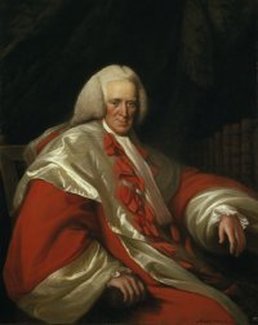Henry Home, Lord Kames (1696-1782)

Henry Home (pronounced ‘Hume’) is better known by the name Lord Kames, the title he took when he became a judge in the Scottish Court of Session. The title derives from the family home, Kames House in Berwickshire, where he was born and privately educated. Modest family circumstances meant that Kames, unlike his intellectual contemporaries, did not attend university, but went to Edinburgh to train as a solicitor instead. He qualified for admission to the Faculty of Advocates in 1723 and in due course established a successful legal practice. In 1752 he was raised to the bench of the Court of Session, and in 1765 rose still higher with his elevation to the High Court of Justiciary. A year later, through his wife, he inherited an estate at Blair Drummond. As a result his material circumstances changed radically, and he became a wealthy man.
Despite lacking a university education, Kames was a central figure in the flowering of intellectual life now known as the Scottish Enlightenment. He was a member of several of Edinburgh’s philosophical clubs, he corresponded with David Hume and some years later had a sustained exchange with Thomas Reid. He was instrumental in commissioning Adam Smith as a free-lance lecturer in Edinburgh in the years before Smith’s appointment to the Chair of Moral Philosophy at Glasgow. He was in constant debate with his eccentric fellow judge Lord Monboddo. Kames himself wrote and published a great deal. Much of it was related to the law, but he also wrote copiously on philosophy, history, literary criticism and religion. In 1762 his two volumes on Elements of Criticism addressed topics characteristic of the Enlightenment – the nature of emotion and the rationality of aesthetic ‘taste’.
His major work, entitled Sketches on the History of Man, was published in 1774 when Kames was 78 years of age. Contrary to what might be supposed from the title, this work comprised two large volumes on which, he declared, he had been working for over 30 years. In it Kames traces human history through four distinct stages—from hunter-gatherers, to animal herders, agriculturalists, and finally urban dwellers and seafarers. This ‘stadial’ movement generates a corresponding progressive cultural development from families to larger societies, to trade and employment (or slavery) and finally to laws, law enforcers, commerce, politics and the arts.
Kames’s Sketches were based on a prodigious amount of information he had gathered on a vast variety of subjects. They provided both the stimulus and the pattern for other ‘conjectural’ histories such as Adam Ferguson's Essay on the History of Civil Society. They thereby laid the foundations for two emerging subjects -- anthropology and sociology – and they exercised considerable influence on the shape and direction of these subjects for several generations. A second edition of the Sketches appeared in 1778 and a considerably expanded third edition in 1788.
The book was translated into German and published in America. It continued to be printed into the nineteenth century. But eventually the ‘stadial’ progressive conception of history at its heart fell out of favor, and Kames was relegated to notes in the history of the Enlightenment. In comparison to Hume and Smith, or even Reid, he fell into near total neglect. More recently, however, interest in his writings has revived, not least because of new scholarly editions of the Sketches, Essays on the Principles of Morality and Natural Religion, and Elements of Criticism that have been published in Liberty Fund’s Natural Law and Enlightenment Classics series. The Elements in particular has prompted a re-examination of some issues in aesthetics in which, arguably, Kames offers more plausible solutions than Hume.
Kames lived to what was for his time an unusually old age and remained active until shortly before his death. At eighty-four he made yet another trip to England where an acquaintance remarked, ‘He is as gay and nimble as when he was twenty five, his sight hearing, memory perfect; he is a most entertaining companion’. ‘Why should I sit with my finger in my cheek waiting till death takes me?’ he is reported to have said.
Enlightenment Philosophers
- Alexander Gerard ((1728-1795)
- Gershom Carmichael (1672-1729)
- Archibald Campbell (1691-1756)
- Francis Hutcheson (1694-1746)
- Henry Home, Lord Kames (1696-1782)
- Robert Wallace (1697-1771)
- George Turnbull (1698-1748)
- Thomas Reid (1710-1796)
- David Fordyce (1711-1751)
- David Hume (1711-1776)
- James Burnett, Lord Monboddo (1714-1796)
- Hugh Blair (1718-1800)
- George Campbell (1719-1796)
- William Robertson (1721-1793)
- Adam Smith (1723-1790)
- Adam Ferguson (1723-1816)
- John Millar (1735-1801)
- James Beattie (1735-1803)
- Dugald Stewart (1753-1828)
- Archibald Alison (1757-1839)